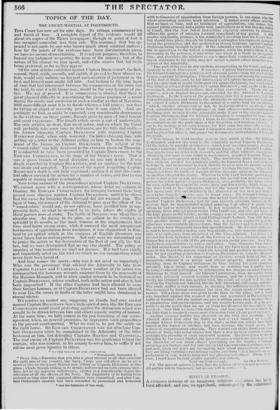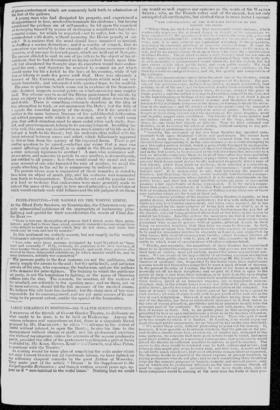SINGULAR EVASION.
A CURIOUS instance of an imaginary religious cii,,tiaction has lately been afforded, and one, we apprehend, encouraged by the exhibitions
of pious contentment which are commonly held forth to admiration at the foot of the gallows.
A young man who had dissipated his property, and experienced a disappointment in love, resolved to terminate his existence ; but having considered the perilous sin of self-murder, he hit upon the expedient of destroying himself by means of destroying a neighbour's hay-ricks ; a capital crime, for which he expected—not to suffer, but—to be ac- commodated with death, without incurring the Divine penalty of sui- cide f It is curious that the mind should have imagined so fanciful, so shuffling a saving distinction ; and it is worthy of remark, that its conception was referable to the examples of religious assurance of for- 6veness, and passage to instant peace, which are held out at Neirgal e. The person alluded to said, in one of his letters to the object of his at- tachment, that he had determined on laying violent hands upon him- self, but abandoned the thought since its execution would have endan- presersation, and consents to perish to save another, is deemed heroic, and entitled to all praise ; how then would stand the moral and reli- gious account of one who hazarded the ruin of another, to avoid the penalty attaching to the act he is compassing by indirect means ? The person whose case is sue-gestive" of these remarks, is stated to have been an object of much pity, and his sentence was commuted from death to transportation. Thus, both the act and the popular view of it lead us to desire that endeavours were more generally made to instract the mass of the people in true moral principles, a knowledge of which would exclude such wild fallacies and the idle judgment on them.



















 Previous page
Previous page